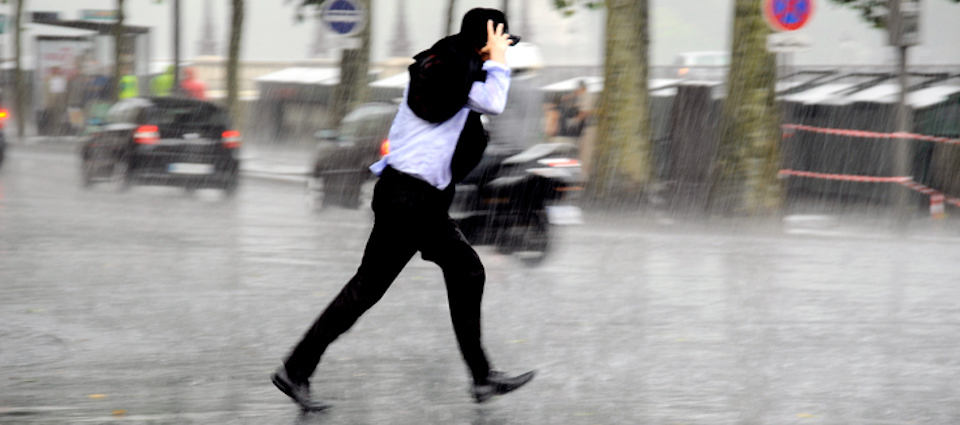The weather has typically been the go-to form of small talk—what you bring up when you want to avoid the weighty subject of say, politics. But no more!
Politicos have long known that the weather, and rain in particular, affects voter turnout. But a new study takes it even further, suggesting that the weather on election day actually influences what the winners do after they take office.
It may sound bizarre, but here’s the logic:
The study—by Yale assistant political science professor John Henderson and John Brooks, who just completed his political science Ph.D. at Cal—noted that rain disproportionately deters Democrats from getting out to vote. In fact, it found, each additional inch of rainfall “dampens Democratic vote margins by 1.4 to 2 percentage points.” That in turn means that the Democrats who win on rainy days do so with smaller victory margins than they otherwise would have enjoyed on a sunny day. Because such close victory margins make them feel vulnerable about ever getting re-elected, those Democrats move to the right once in office in hopes of pleasing what appears, based on the distorted rainy-day turnout, to be a more conservative electorate in their districts.
“Using rain as an instrument,” the authors wrote, “we find conservative shifts in win-margins move incumbents rightward in their roll-call voting in the next Congress.”
So to be clear, since we’re cutting the small talk and moving past the weather: The important takeaway from the study isn’t that rain can affect turnout (other studies already have proven this), but rather, how turnout can affect how the winners go about doing their job in Congress.
Brooks and Henderson looked at lawmakers to see how their policy positions change after the election. They found that in competitive races where rain depressed turnout, Democratic victors who then won by slimmer margins cast more conservative roll call votes in Congress. Republicans appear to be more waterproof all the way around—not only are Republican voters less likely to let rain discourage them from voting, but Republican lawmakers who win even squeaker elections also are less likely to let that moderate their roll call votes.
There are various explanations as to why GOP politicians seem more resistant to the pull of moderation. One theory is that Republicans are simply more loyal to their party’s conservative ideology; another is that Democratic officials are more likely to moderate their politics because they tend to be in tighter races all across the country.
An analysis of the 2014 congressional elections reveals that the average margin of victory for Republican winners was 24.7 percent, while the average margin for Democratic winners was 18.7 percent, with Republicans winning most noncompetitive races. And between the years of 1992 and 2012, swing districts have been on the decline while landslide districts, those that are at least 20 percent more Republican-leaning or Democrat-leaning than the country as a whole, have been slowly on the rise.
“It follows that we expect more attentiveness to district opinion among Democratic candidates/incumbents”, explains UC Berkeley political science professor Laura Stoker, “because the closeness of the races they are facing does not give them the luxury” of straying too far from the politics of their constituencies.
In theory, Congressional representatives are supposed to hew to the politics back in their home districts; i.e, to represent. But they don’t get a lot of “credible signals” as to what voters actually want them to do. One of those indicators of the mood of their electorate is what their electoral margin was in the last election—but, as Brooks says, “even the most credible signals are subject to noise—which is what rain basically is.”
As the study puts it, the “idiosyncratic signals can cascade into policymaking and electoral politics in modest, but meaningful and troubling ways.”
Of course what the new study indicates is that even when politicians try to adapt to please their districts, extraneous factors may lead them to misinterpret what voters actually want. Even so, Brooks contends that the fact that they want to adapt is a good thing.
“I like that members of Congress, or at least some, are able to adapt, are able to respond to voters,” Brooks says. “They’re not totally just driven by money, greed and special interests. The voters might play some role here in influencing them. Because even though we’re showing rain results, really we’re showing that turnout matters for how members of Congress vote.”
And that, in turn, might explain a lot about how power gets wielded within the current Congress.
“It’s a new strong piece of evidence in support of the story that the greater ideological moderation you see in House Democrats is tied to their vulnerability,” says Stoker. “When Democrats find themselves in these vulnerable electoral positions, they have to moderate their voting behavior to be more centrist, maybe even a little bit right leaning, but certainly not as liberal as you’ll find a member of Congress in liberal districts like New York or California.”
Competitive elections, she adds, force members of Congress to be accountable. “I think we all would like to have more bipartisan and cross-partisan coalitions; we’d like to see all parties working more together. Now that requires that there be more moderates on the Republican side—and we don’t see that.”



















